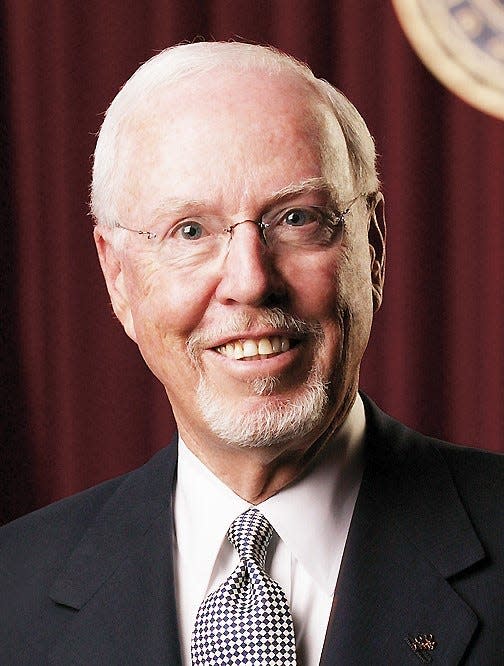Facts matter. The Glossip case shows us why

- Oops!Something went wrong.Please try again later.
Finality is an important principle in our criminal justice system. Elevating finality above all else, though, can prove dangerous and undermine justice in rare cases ― cases like Richard Glossip’s, where it is revealed years later that evidence was withheld by the state. Justice requires that all sides play fair. To continue to use finality to justify an execution where the state’s chief law enforcement officer has agreed the trial was fundamentally unfair would be a perversion of justice. Simply put, it cannot be the Oklahoma way.
More: Death row inmate Richard Glossip gets execution stay from US Supreme Court
In 2004, an Oklahoma County jury found Glossip guilty of murder and sentenced him to death for a murder-for-hire plot that the state alleged he orchestrated. He has been on death row ever since. Over two decades, multiple appeals and petitions have upheld that jury verdict. You would think the conviction ought to be considered final by now.
But in 2023 it was discovered that the prosecutors did not play fair. They did not disclose a number of critical facts. These facts challenge long-held beliefs about the case, revealing that Glossip’s trial was plagued with errors and misdeeds by the state.
When I look at the complete set of facts that are now known about Glossip’s case, I have serious concerns about the fairness of his trial. I am troubled as to the reliability of the verdict that was rendered by a jury that never had an opportunity to consider important withheld evidence about the state’s key witness.
I understand that some residents may be disinclined to reconsider their long-held opinions on this case. But as a former district attorney, I also know that facts, not emotion, must be our guide, regardless of when those facts come to light.
During my years as district attorney of Oklahoma County, I prosecuted many cases and supervised hundreds of others, including some seeking the death penalty. As a prosecutor, I represented the state’s interests in seeking justice, the families of the victims, and all residents of Oklahoma County. I was guided by the U.S. Supreme Court’s directive that death cases require the highest standard of reliability.
The case against Glossip depended almost entirely on the testimony of Justin Sneed, the admitted killer. Everything turned on Sneed’s credibility. That is where the newly disclosed evidence comes in. Only recently, it was discovered that, before Glossip’s trial, prosecutors were told facts by Sneed in a pretrial interview that he saw a psychiatrist and was on lithium. The prosecutors did not disclose these facts to the defense or the jury.
These facts had been kept hidden in a box in the Oklahoma County district attorney’s office and were not disclosed to Glossip’s attorneys until Jan. 27, 2023, when Attorney General Gentner Drummond released the box. The jurors who decided Glossip’s fate did not know these critical facts.
Prosecutors are supposed to be “ministers of justice.” That should be a prosecutor’s top priority — not to win cases, not their own reputation, not placing any one voice above others. Justice for victims and our community has to be attained fairly. Our nation’s Constitution requires that. And you do not have to go to law school to know that a trial is not fair if the state prevents the jury from learning all the relevant facts. Fortunately, this does not happen all the time. But when it does, what kind of state would we be if we allowed the result of an unfair trial to justify executing a man so we can claim finality and closure?
There has never been an execution in the history of this great nation where the state has agreed the defendant’s trial was unconstitutional. Oklahoma cannot be the first state to do this. As the attorney general stated to the U.S. Supreme Court, proceeding with an execution under these circumstances would be “unthinkable.”
More: 'Dr. Phil' speaks at Oklahoma City rally to release Richard Glossip from death row
Attorney General Drummond did not reach the decision that Glossip’s trial was fundamentally unfair on a whim. He commissioned a thorough independent investigation by a former Oklahoma district attorney. On the basis of that investigation and his own review of the evidence, Attorney General Drummond has not proposed that Glossip should be released from prison. But he has determined that a jury must hear all the evidence and the state must play fair before it executes a man. This is the kind of tough decision the people of Oklahoma elected him to make.
Facts must guide us to the just result here. Finality of error cannot be the Oklahoma way.

Andrew M. Coats is a military veteran. He has served as district attorney of Oklahoma County, a former mayor of Oklahoma City, president of Oklahoma Bar Association, and president of the American College of Trial Lawyers and is dean emeritus of the University of Oklahoma’s College of Law and a senior partner at Crowe & Dunlevy. He had no involvement with the independent investigation of State v. Richard Glossip.
This article originally appeared on Oklahoman: Guest: The Glossip case shows why facts matter

